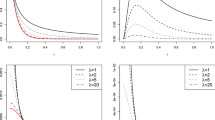Summary
Let (Ω,A) be a measurable space, let Θ be an open set inR k, and let {P θ; θ∈Θ} be a family of probability measures defined onA. Let μ be a σ-finite measure onA, and assume thatP θ≪μ for each θ∈Θ. Let us denote a specified version ofdP θ /d μ byf(ω; θ).
In many large sample problems in statistics, where a study of the log-likelihood is important, it has been convenient to impose conditions onf(ω; θ) similar to those used by Cramér [2] to establish the consistency and asymptotic normality of maximum likelihood estimates. These are of a purely analytical nature, involving two or three pointwise derivatives of lnf(ω; θ) with respect to θ. Assumptions of this nature do not have any clear probabilistic or statistical interpretation.
In [10], LeCam introduced the concept of differentially asymptotically normal (DAN) families of distributions. One of the basic properties of such a family is the form of the asymptotic expansion, in the probability sense, of the log-likelihoods. Roussas [14] and LeCam [11] give conditions under which certain Markov Processes, and sequences of independent identically distributed random variables, respectively, form DAN families of distributions. In both of these papers one of the basic assumptions is the differentiability in quadratic mean of a certain random function. This seems to be a more appealing type of assumption because of its probabilistic nature.
In this paper, we shall prove a theorem involving differentiability in quadratic mean of random functions. This is done in Section 2. Then, by confining attention to the special case when the random function is that considered by LeCam and Roussas, we will be able to show that the standard conditions of Cramér type are actually stronger than the conditions of LeCam and Roussas in that they imply the existence of the necessary quadratic mean derivative. The relevant discussion is found in Section 3.
Similar content being viewed by others
References
Bahadur, R. R. (1964). On Fisher's bound for asymptotic variances,Ann. Math. Statist.,35, 1545–1552.
Cramér, H. (1946).Mathematical Methods of Statistics, Princeton.
Davidson, R. R. and Lever, W. E. (1970). The limiting distribution of the likelihood ratio statistic under a class of local alternatives,Sankhya Ser. A,32, 209–224.
Johnson, R. A. and Roussas, G. G. (1969). Asymptotically most powerful tests in Markov processes,Ann. Math. Statist.,40, 1207–1215.
Johnson, R. A. and Roussas, G. G. (1970). Asymptotically optimal tests in Markov processes,Ann. Math. Statist.,41, 918–938.
Johnson, R. A. and Roussas, G. G. (1971). Applications of contiguity to multiparameter hypothesis testing,Proc. 6th Berkeley Symp. Math. Statist. Prob., 195–226.
Kaufman, S. (1966). Asymptotic efficiency of the maximum likelihood estimator,Ann. Inst. Statist. Math.,18, 155–178.
Kestelman, H. (1960).Modern Theories of Integration, Dover Publications, Inc. New York.
LeCam, L. (1956). On the asymptotic theory of estimation and testing hypotheses,Proc. 3rd Berkeley Symp. Math. Statist. Prob., 129–156.
LeCam, L. (1960). Locally asymptotically normal families of distributions,Univ. Calif. Pub. Statist.,3, 37–98.
LeCam, L. (1966). Likelihood functions for large numbers of independent observations,Research Papers in Statistics (F. N. David, editor), Wiley, New York.
LeCam, L. (1970). On the assumptions used to prove asymptotic normality of maximum likelihood estimates,Ann. Math. Statist.,41, 802–828.
Lind, R. B. and Roussas, G. G. (1970). Multiparameter differentiation in quadratic mean and asymptotically optimal tests for some failure distributions,Technical Report No. 227, University of Wisconsin, Madison.
Roussas, G. G. (1965). Asymptotic inference in Markov processes,Ann. Math. Statist.,36, 978–992.
Roussas, G. G. (1968). Asymptotic normality of the maximum likelihood estimate in Markov processes,Metrika,14, 62–70.
Roussas, G. G. (1968). Some applications of the asymptotic distribution of likelihood functions to the asymptotic efficiency of estimates,Zeit Wahrscheinlichkeitsth.,10, 252–260.
Schmetterer, L. (1966). On the asymptotic efficiency of estimates,Research Papers in Statistics (F. N. David, editor), Wiley, New York.
Wald, A. (1941). Asymptotically most powerful tests of statistical hypotheses,Ann. Math. Statist.,12, 1–19.
Wald, A. (1943). Tests of statistical hypotheses concerning several parameters when the number of observations is large,Trans. Amer. Math. Soc.,54, 426–482.
Weiss, L. and Wolfowitz, J. (1966). Generalized maximum likelihood estimators,Theory Prob. Appl.,11, 58–81.
Author information
Authors and Affiliations
Additional information
This research was supported by the National Science Foundation, Grant GP-20036.
About this article
Cite this article
Lind, B., Roussas, G. Cramér-type conditions and quadratic mean differentiability. Ann Inst Stat Math 29, 189–201 (1977). https://doi.org/10.1007/BF02532783
Received:
Issue Date:
DOI: https://doi.org/10.1007/BF02532783




